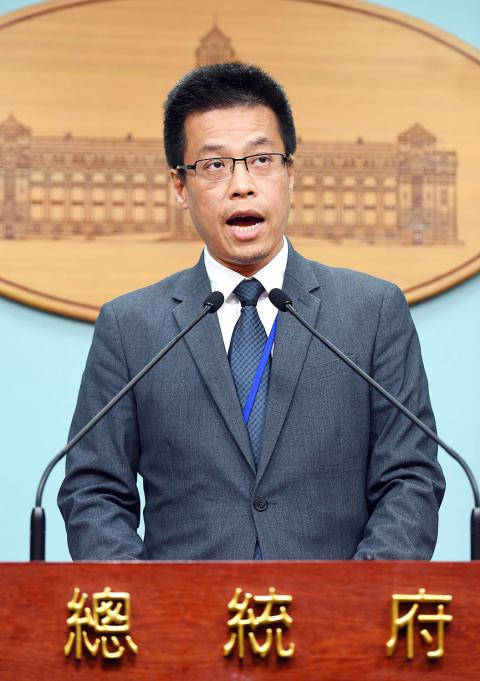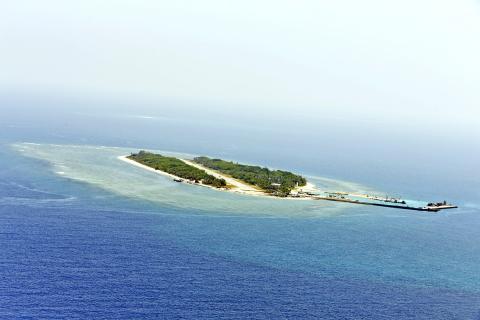Taiwan yesterday refused to accept a ruling by the Permanent Court of Arbitration in The Hague, Netherlands,which included a statement that Taiwan-controlled Itu Aba Island (Taiping Island, 太平島) in the Spratly Islands (Nansha Islands, 南沙群島) is a “rock,” saying the verdict has severely infringed on Taiwan’s rights over the South China Sea island and its surrounding waters.
In the case brought by the Philippines against China over their disputes in the South China Sea, the Philippines argued that land formations claimed by Beijing in the South China Sea are not islands and therefore not entitled to 200 nautical mile (370.4km) exclusive economic zones.
While Taiwan was not party to the case, its claims in the South China Sea are similar to those of China and Itu Aba Island was brought up in testimony during the court hearings.

Photo: Chang Chia-ming, Taipei Times
The international tribunal yesterday concluded that all of the high-tide features in the Spratly Islands, including Itu Aba, are legally “rocks” that do not generate an exclusive economic zone or continental shelf.
“We hereby stress that the Republic of China [ROC] enjoys rights as afforded by international law and the UN Convention on the Law of the Sea over South China Sea islands and their relevant waters,” Presidential Office spokesman Alex Huang (黃重諺) told a news conference following the issuance of the verdict yesterday afternoon.
Huang said that as Taipei was not invited to participate in the arbitration process, nor consulted on its opinion, the government solemnly declares its refusal to recognize the tribunal’s verdict and deems it as carrying no legal effect on the nation.

Photo: EPA
Reiterating the nation’s sovereignty claims over South China Sea islands and their surrounding waters, Huang said the government pledges to steadfastly safeguard the nation’s territory and sovereignty, and would prevent any infringement of its national interests.
“We call for a peaceful resolution of disputes in the South China Sea through multilateral negotiations,” he added.
Shortly after the ruling was issued, President Tsai Ing-wen (蔡英文) convened a high-level government meeting, Huang said, adding that the government has decided to move forward by one day a patrol mission to the South China Sea by a Kang Ding-class frigate originally scheduled for tomorrow.
Minister of Foreign Affairs David Lee (李大維) made an intriguing statement at a news conference at the ministry at 8pm yesterday, saying that while the international tribunal’s categorization of Itu Aba as a “rock” was the worst-case scenario for the government, Tsai would “take action” today.
Asked whether Tsai plans to board the frigate leaving for the South China Sea, Lee said: “I can say no more.”
Reacting to the ruling, Chinese Nationalist Party (KMT) Culture and Communications Committee director Chow Chi-wai (周志偉) said that it was utterly unacceptable and unsatisfactory.
Chow added that the “U-shaped line” representing the nation’s territory in the region covers a total sea area of 3.6 million square kilometers, which is more than 100 times the size of Taiwan.
“We must not relinquish our nation’s strategic interests,” Chow said, urging Tsai to clearly declare the nation’s stance and safeguard its interests.
The line — also known as the “11-dash line” — was featured in the “Location Map of the South China Sea Islands” drawn up by the ROC government in 1947. After the KMT lost the Chinese Civil War and fled to Taiwan, the Chinese Communist Party changed it to a “nine-dash line.”
Saying there is potable water and people living on Itu Aba, KMT caucus secretary-general Lin Te-fu (林德福) urged Tsai to visit the island to formally declare the nation’s sovereignty and show to the world that it is an island.
KMT Legislator Johnny Chiang (江啟臣) said Taiwan is probably “the greatest loser” in the arbitration.
“[China] has fists and countries in the South China Sea will now have an international ruling — even though the ruling is not legally binding — and the US to back their claims, but Taiwan’s island has become a rock overnight,” Chiang said.
KMT Legislator Lai Shyh-bao (賴士葆) advised the government to take “hardline measures,” such as “sending out warships immediately to the area to protect the nation’s territory.”
Former president Ma Ying-jeou (馬英九), who on January 28 visited Taiping Island in an effort to reject the Philippines’ categorization of it as a "rock" and prove to the international community that the island can sustain human habitation and economic life, posted a message on Facebook late yesterday, saying that as are all Taiwanese people, he is extremely astonished and enraged by the ruling.
The People First Party also issued a statement dismissing the ruling, saying the government must refuse to recognize any verdicts or announcements regarding South China Sea islands handed down by international courts based on “hypocritical reasons” or technicalities.
Meanwhile, the American Institute in Taiwan, reiterating its long-standing policy, said the US supports the peaceful resolution of disputes in the South China Sea, including the use of international legal mechanisms such as arbitration.
Additional reporting by Alison Hsiao

Tropical Storm Gaemi strengthened into a typhoon at 2pm yesterday, and could make landfall in Yilan County tomorrow, the Central Weather Administration (CWA) said yesterday. The agency was scheduled to issue a sea warning at 11:30pm yesterday, and could issue a land warning later today. Gaemi was moving north-northwest at 4kph, carrying maximum sustained winds near its center of up to 118.8kph and gusts of 154.8kph. The circumference is forecast to reach eastern Taiwan tomorrow morning, with the center making landfall in Yilan County later that night before departing from the north coast, CWA weather forecaster Kuan Shin-ping (官欣平) said yesterday. Uncertainty remains and

SEA WARNING LIKELY: The storm, named Gaemi, could become a moderate typhoon on Wednesday or Thursday, with the Taipei City Government preparing for flooding A tropical depression east of the Philippines developed into a tropical storm named Gaemi at 2pm yesterday, and was moving toward eastern Taiwan, the Central Weather Administration (CWA) said. Gaemi could begin to affect Taiwan proper on Tuesday, lasting until Friday, and could develop into a moderate typhoon on Wednesday or Thursday, it said. A sea warning for Gaemi could be issued as early as Tuesday morning, it added. Gaemi, the third tropical storm in the Pacific Ocean this typhoon season, is projected to begin moving northwest today, and be closest to Taiwan on Wednesday or Thursday, the agency said. Today, there would likely

DISRUPTIONS: The high-speed rail is to operate as normal, while several airlines either canceled flights or announced early departures or late arrivals Schools and offices in 15 cities and counties are to be closed today due to Typhoon Gaemi, local governments announced last night. The 15 are: Taipei, New Taipei City, Taoyuan, Tainan, Keelung, Hsinchu and Kaohsiung, as well as Yilan, Hualien, Hsinchu, Miaoli, Chiayi, Pingtung, Penghu and Lienchiang counties. People should brace for torrential rainfall brought by the storm, with its center forecast to make landfall on the east coast between tonight and tomorrow morning, the Central Weather Administration (CWA) said. The agency issued a sea warning for the typhoon at 11:30pm on Monday, followed by a land warning at 11:30am yesterday. As of

CASUALTY: A 70-year-old woman was killed by a falling tree in Kaohsiung as the premier warned all government agencies to remain on high alert for the next 24 hours Schools and offices nationwide are to be closed for a second day today as Typhoon Gaemi crosses over the nation, bringing torrential rain and whipping winds. Gaemi was forecast to make landfall late last night. From Tuesday night, its outer band brought substantial rainfall and strong winds to the nation. As of 6:15pm last night, the typhoon’s center was 20km southeast of Hualien County, Central Weather Administration (CWA) data showed. It was moving at 19kph and had a radius of 250km. As of 3pm yesterday, one woman had died, while 58 people were injured, the Central Emergency Operation Center said. The 70-year-old